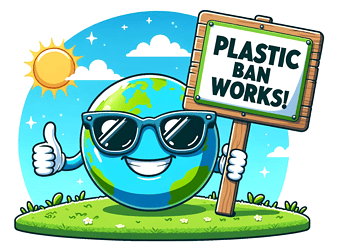Our world is saturated by plastic we don’t really need. Just take a look at one of the most common and persistent culprits : the single-use plastic bag. These bags are the quintessential symbol of humanity’s careless entanglement with disposable convenience. But a new study published in Science offers rare, quantifiable good news: bans and fees on plastic bags really do reduce the mess—by a lot.
“The main finding is that these plastic bag policies are effective in limiting, although not eliminating, plastic bag litter in the environment,” Anna Papp, an environmental economist and the study’s lead author, told Popular Science.

A Cleaner Shoreline, One Policy at a Time
The researchers, Anna Papp and Kimberly Oremus, dug into one of the most comprehensive data troves ever assembled on plastic litter: shore cleanups. Specifically, they looked at 45,067 shoreline cleanups conducted across the United States between 2016 and 2023. Volunteers cataloged every item they picked up along lakes, rivers, and beaches—plastic bottles, cigarette butts, food wrappers. Among the most frequently found were, of course, plastic bags.
Overlaying this citizen science data with a patchwork of 182 local and state-level plastic bag policies enacted between 2017 and 2023, the team found a compelling pattern. In places with plastic bag bans or fees, the share of plastic bags among litter items dropped by an average of 25 to 47% compared to places without such policies.
Even more encouraging: the longer the policy had been in place, the greater the reduction in plastic bag litter. The trend held firm through a variety of statistical checks, ruling out other explanations.
“It was surprising to see that these policies were working,” said Oremus, an environmental economist at the University of Delaware. “There are many things that can happen to a bag between when you get it at a store and it becomes litter along the shoreline.”
A National Patchwork But Bag Fees Are the Most Efficient

Plastic bag policies in the U.S. are a mixed mosaic, a patchwork of legislation. Some 611 policies have been passed at the town, county, or state level. As of 2023, roughly one-third of Americans—about 116 million people—live in places with some form of bag regulation. State-level bans appear to have the strongest effect, likely due to their broader geographic reach and reduced risk of spillover from unregulated areas.
And yet, 17 U.S. states have enacted “preemption” laws to prevent local bag bans altogether.
Despite this policy tug-of-war, the results are hard to ignore. Along coastlines, rivers, and even lakes—where the effects were sometimes more pronounced—bag bans correlated with significantly cleaner shorelines.
“Compared to no policy, it’s clear bag bans are better at reducing shoreline plastic bag litter,” Oremus said.
Globally, more than 100 countries have enacted plastic bag restrictions, and 175 nations are currently negotiating a United Nations treaty to curb plastic pollution. The study arrives as momentum builds for international action.
“Plastic bags are just one of the many types of plastic waste in the environment,” Papp told Time. “So, bag regulations are far from a complete solution.”
Tangled in Trash: Plastic’s Toll on Nature
Beyond the visible nuisance of plastic clutter, the stakes are ecological—and urgent. Lightweight plastic bags frequently escape trash bins, riding wind currents until they reach waterways. There, they can entangle wildlife or break down into harmful microplastics that infiltrate marine food chains and, eventually, our own bodies.
The study found a suggestive—though not yet conclusive—30 to 37% reduction in reports of wildlife entanglements in areas with plastic bag policies. While the data was too sparse to draw firm conclusions, it points toward another important benefit.
Despite their success, the policies don’t fully reverse the problem. Across all sites studied, the proportion of plastic bags in shoreline litter actually rose between 2016 and 2023. But in areas with bans or fees, the increase was far smaller—evidence that while the tide of plastic pollution is rising, these policies slow the surge.

Can We Stop the Plastic Flood?
Plastic production continues to grow. Over 460 million metric tons of plastic are manufactured globally each year, and more than 20 million of those tons end up polluting the environment. According to the OECD, that number could triple by 2060 without major intervention.
One 2022 estimate put the cost of plastic waste to the global economy at $100 billion annually, largely due to damage to tourism, marine property, and biodiversity. The new findings suggest that smart, targeted regulations can make a real dent in that cost.
But they also underscore the limits of consumer-facing policies.
“Plastic bags and single-use plastics in general continue to be very convenient, cheap, and available in many different places,” Papp added. “So it’s perhaps not surprising that overall usage of them continues to increase.”
In other words, stopping plastic waste at the checkout line is helpful—but stopping it at the factory door may be essential.
As the world heads toward the next round of U.N. treaty negotiations in August 2025, this study offers a rare and vital proof point. Amid a sea of plastic pollution, it shows that change is not just possible—it’s measurable. And with the right tools, the tide might still be turned.






